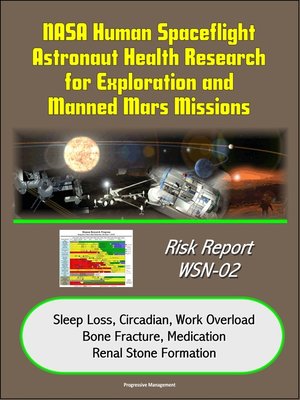NASA Human Spaceflight Astronaut Health Research for Exploration and Manned Mars Missions, Risk Report WSN-02, Sleep Loss, Circadian, Work Overload, Bone Fracture, Medication,...
ebook
By Progressive Management

Sign up to save your library
With an OverDrive account, you can save your favorite libraries for at-a-glance information about availability. Find out more about OverDrive accounts.
Find this title in Libby, the library reading app by OverDrive.



Search for a digital library with this title
Title found at these libraries:
| Loading... |
Professionally converted for accurate flowing-text e-book format reproduction, this series of reports deals with ongoing research by NASA into a risk reduction strategy for human space exploration and planned manned missions to Mars. Each report deals with a unique aspect of the human research needed to pursue long-duration missions. Many of the reports contain exclusive details about medical events impacting astronauts and cosmonauts on earlier flights, including Mir, Space Shuttle, and ISS Space Station missions.
Each risk Evidence Report contains a narrative discussion of the risk and its supporting evidence. All cited publicly-available references are listed at the end of the report. In addition, data that are significant or pivotal are summarized in text, tables, and charts in sufficient detail to allow the reader to critique the data and draw conclusions. The authors also indicate whether the data are from human, animal, or tissue, cellular, or molecular studies. The reports discuss evidence from both spaceflight (including biomedical research, Medical Requirements Integration Document [MRID] data, and operational performance or clinical observations) and ground (including space analog research and non-space analog biomedical or clinical research) research. When providing evidence from ground-based studies, authors discuss why these results are likely to be applicable in the space environment, offering any available validation information for the use of these ground-based systems.
Reports included in this compilation:
Evidence Report: Risk of Performance Decrements and Adverse Health Outcomes Resulting from Sleep Loss, Circadian Desynchronization, and Work Overload * Evidence Book: Risk of Bone Fracture * Evidence Report: Risk of Therapeutic Failure Due to Ineffectiveness of Medication * Evidence Book: Risk of Renal Stone Formation
Sleep loss, circadian desynchronization, and work overload occur to some extent for ground and flight crews, prior to and during spaceflight missions. Ground evidence indicates that such risk factors may lead to performance decrements and adverse health outcomes, which could potentially compromise mission objectives. Efforts are needed to identify the environmental and mission conditions that interfere with sleep and circadian alignment, as well as individual differences in vulnerability and resiliency to sleep loss and circadian desynchronization.
Bone mineral loss occurs in microgravity due to unloading of the skeletal system, with average loss rates of approximately 1% per month. It is unclear whether this bone mineral density will stabilize at a lower level, or continue to diminish. It is also unknown if fractional gravity, present on the moon and Mars would mitigate the loss.
Crew health and performance is critical to successful human exploration beyond low Earth orbit. The Human Research Program (HRP) investigates and mitigates the highest risks to human health and performance, providing essential countermeasures and technologies for human space exploration. Risks include physiological and performance effects from hazards such as radiation, altered gravity, and hostile environments, as well as unique challenges in medical support, human factors, and behavioral health support. The HRP utilizes an Integrated Research Plan (IRP) to identify the approach and research activities planned to address these risks, which are assigned to specific Elements within the program.
The HRP utilizes various research platforms to conduct research. Ground research occurs in laboratories and analogs that mimic a portion of the spaceflight environment. In addition, the International Space Station (ISS) is used to...






